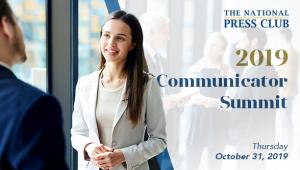Communicators' Summit cites PR hits and misses, gives science-based tips on handling crises
 Homer Simpson and Spock appeared at the National Press Club’s 2019 Communicators' Summit Oct. 31 as playful, fictional stereotypes of two different brain-wirings. Also serving as teaching tools at the event were Twitter's new political ad ban, Gulf Oil, the viral video of Dr. David Dao forcibly dragged from his United Airlines flight, a plea for more love and trust in communications and a mercifully brief mention of Hegelian dialectics as a guide in hard times.
Homer Simpson and Spock appeared at the National Press Club’s 2019 Communicators' Summit Oct. 31 as playful, fictional stereotypes of two different brain-wirings. Also serving as teaching tools at the event were Twitter's new political ad ban, Gulf Oil, the viral video of Dr. David Dao forcibly dragged from his United Airlines flight, a plea for more love and trust in communications and a mercifully brief mention of Hegelian dialectics as a guide in hard times.
Nobody ignored baseball’s new World Series winner, the Washington Nationals -- especially after one or more Houston Astros fans texted a ransom demand to Danny Selnick, the Club's Communicator Team chair and conference opener, if he ever wanted to see his Nationals baseball cap return to the podium.
Panelist Josh Wright said Homer and Spock represent outdated mental models of an intuitive person lacking self-control (Homer) and an unemotional and contemplative person (Spock). Behavioral Science today knows more about the human mind and what can help us better communicate, said Wright, executive director of ideas42, a firm that designs and implements behavioral solutions to problems.
“Context matters way more than you realize, and determines 70 percent of our decision-making,” he said.
Wright noted, for example, that in World War II a cockpit redesign stopped crash landings on B17 bombers by changing a crucial button’s shape from a circle to a triangle so pilots wouldn’t mistake it for its round neighbor. Among 10 tips Wright offered: recognize the power of reciprocity because we feel beholden when we’re given something; stories are far more effective than facts, even when “totally untrue” because they simplify complex issues.
Sweta Chakraborty, a risk and behavioral scientist at The Atlantic Council, told how college dropout rates fell 50 percent after incoming freshmen watched videos of students admitting they’d faced and overcome struggles in college. Success, she said, depended on a trusted messenger -- a fellow student.
Mike McCurry, former President Clinton’s press secretary and Director of the Center for Public Theology, named “five C’s” for crisis communications in a conversation with NPC President Alison Fitzgerald Kodjak.
His list: (1) Credibility: “maintain your status as a straight shooter”; (2) Candor: admit when something goes wrong; (3) Clarity: phrase your message so people say, “Oh, I get it!” (4) Compassion: Avoid the harsh language in today’s discourse and respect the listener’s ability to process information and give them time to absorb it. (5): Commitment: It takes work, and it’s why you need to be at the table with your CEO/top organization leaders to help shape the message and tell the lawyers, “That’s not going to fly.”
Sonya Gavankar, Newseum PR director and TV host, moderated a panel of journalists from The Associated Press, The Washington Post, BuzzFeed, Fox News and CNN. AP Assignment Manager Lisa Matthews, an NPC governor, suggested communicators check out the wire service’s YouTube channel as a resource for selecting reporters to contact. She also said that following presidential tweets is essential to serve AP’s international clients, who want follow-up on issues like trade with China.
Fox Radio’s Jon Decker said he gets good story ideas from PR pitches, and faulted the 2016 White House press briefing oom where he said all reporters were following each other—"a kind of echo chamber… and a big mistake.”
CNN’s Campaign Editor for CNN Politics, Jessica Estepa, said her most trusted sources for story ideas are the people she’s worked with on Capitol Hill or at USA Today, where she led its breaking and trending news coverage.
BuzzFeed DC Bureau Chief Kate Nocera described her audience as typically younger, college students or high school seniors concerned about the climate movement and student debt.
The day’s most colorful speaker, Richard Levick, claims we’re living in a radical time, a “hyper-democracy” where effective communications require “speed, transparency and trust.” Levick, chairman and CEO of his own firm by that name, advises countries and high-profile companies in crises.
The repeated “non-apology apologies” by United Airlines's CEO after the Dr. Dao dragging incident, Levick said, destroyed the airline’s decades-long campaign to engage China, “as 20 million people an hour in China watched that Dao video. He contrasted United’s response with Gulf Oil’s courage in crisis-handling along with Twitter’s political ad ban. “Our internal communications are also our external communications,” he warned, after predicting “100 percent of you will get hacked.”
Levick also warned of increased Russian attacks on U.S. democracy, using disruptive tactics such as attacking the free press. He added that democracy is voluntary, dependent on citizens making small sacrifices for the greater good such as stopping for a stop sign.
Asked to give one reason for hope, Levick said everything is a Hegelian dialectic, moving from one extreme to another, but examples of great courage exist across the nation. “It starts with honesty and how we treat each other,” he said. “We have to love each other…trust and think the best of each other first.”
